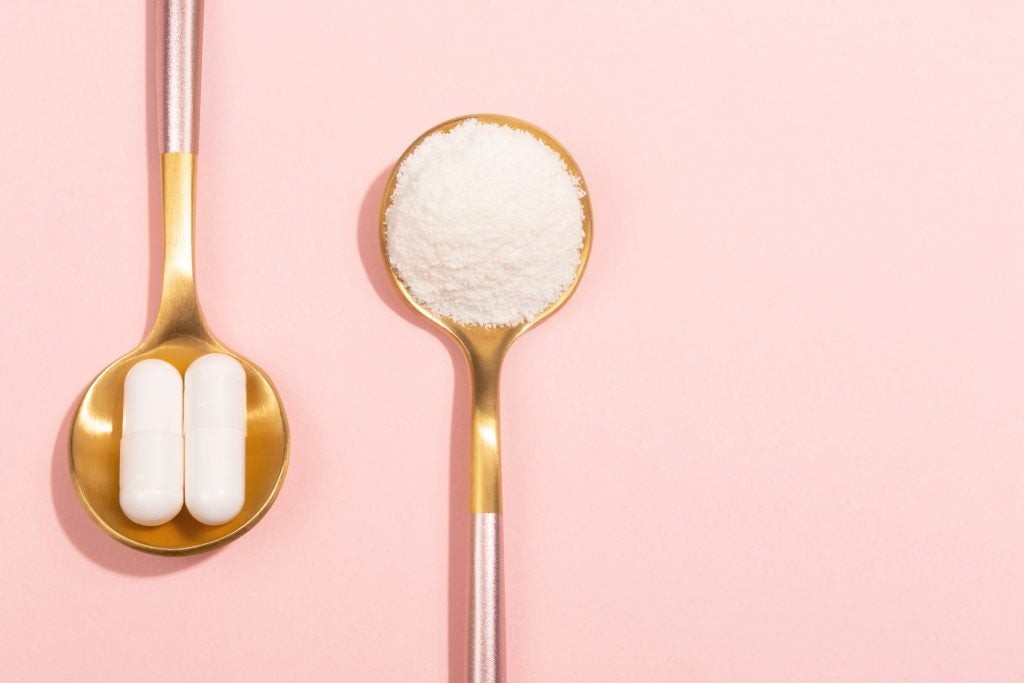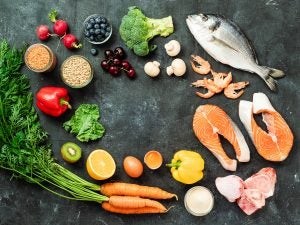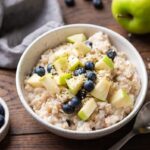Collagen production stimulation is vital for maintaining youthful skin and healthy joints, and FOODS.EDU.VN is here to help you understand how to achieve this naturally. Discover how to enhance your body’s collagen synthesis through diet and lifestyle. Explore the best collagen-boosting foods, collagen-rich foods, and dietary collagen sources that can help you achieve a radiant, healthy life.
1. Understanding Collagen and Its Importance
Collagen, the most abundant protein in our bodies, serves as the foundational building block for skin, bones, muscles, tendons, and ligaments. It’s what gives our skin its elasticity, our joints their flexibility, and our bones their strength. As we age, our natural collagen production declines, leading to visible signs of aging such as wrinkles, sagging skin, and joint pain. However, the good news is that we can influence collagen synthesis through our diet and lifestyle choices.
1.1 The Role of Collagen in the Body
Collagen acts like the glue that holds our bodies together. It provides structural support to tissues, allowing them to withstand stretching and maintain their integrity. Here’s a detailed look at its specific roles:
- Skin: Collagen makes up about 70% of the skin’s dry weight. It provides firmness, elasticity, and hydration, reducing the appearance of wrinkles and fine lines.
- Bones: Collagen forms the organic matrix of bones, providing flexibility and strength. It works alongside calcium to maintain bone density and prevent fractures.
- Joints: Collagen is a major component of cartilage, the cushioning tissue that protects joints from wear and tear. Adequate collagen helps maintain joint mobility and reduces pain.
- Muscles: Collagen supports muscle tissue by providing structure and allowing for proper muscle contraction and flexibility.
- Tendons and Ligaments: These connective tissues, primarily made of collagen, attach muscles to bones and stabilize joints. Collagen provides the strength and elasticity needed for movement and support.
1.2 Factors Affecting Collagen Production
While aging is a primary factor in collagen decline, several other factors can significantly impact collagen synthesis. Understanding these factors can help you make informed choices to protect and boost your collagen levels.
- Age: Collagen production naturally declines with age, starting as early as our mid-20s. This decline becomes more pronounced after menopause in women.
- Sun Exposure: Ultraviolet (UV) radiation from the sun is a major collagen destroyer. It damages collagen fibers, leading to premature aging, wrinkles, and loss of skin elasticity.
- Smoking: Smoking reduces collagen production by impairing blood flow to the skin and introducing harmful chemicals that damage collagen fibers.
- Poor Diet: A diet lacking essential nutrients, such as vitamin C, amino acids, and minerals, can hinder collagen synthesis.
- Stress: Chronic stress can lead to elevated cortisol levels, which can break down collagen and interfere with its production.
- Lack of Sleep: Inadequate sleep disrupts the body’s natural repair processes, including collagen synthesis.
- Excessive Alcohol Consumption: Alcohol can dehydrate the skin and interfere with the production of collagen, leading to premature aging.
2. Key Nutrients That Boost Collagen Production
While some foods naturally contain collagen, the most effective way to enhance collagen levels is by consuming nutrients that support the body’s natural synthesis process. Here’s a comprehensive guide to the key nutrients that stimulate collagen production.
2.1 Vitamin C: The Collagen Catalyst
Vitamin C is a crucial cofactor for enzymes involved in collagen synthesis. It helps stabilize and cross-link collagen molecules, ensuring their proper structure and function. Without sufficient vitamin C, the body cannot effectively produce collagen.
- How it works: Vitamin C acts as an antioxidant, protecting collagen from damage caused by free radicals. It also promotes the formation of procollagen, the precursor to collagen.
- Food sources: Citrus fruits (oranges, lemons, grapefruits), berries (strawberries, blueberries, raspberries), bell peppers, kiwi, broccoli, and leafy green vegetables are excellent sources of vitamin C.
2.2 Amino Acids: The Building Blocks of Collagen
Collagen is a protein composed of amino acids, primarily glycine, proline, and lysine. These amino acids are essential for collagen synthesis and must be obtained through diet.
- How they work: Glycine provides structural integrity to collagen fibers, while proline and lysine are converted into hydroxyproline and hydroxylysine, which stabilize collagen molecules.
- Food sources:
- Glycine: Chicken skin, pork skin, gelatin, bone broth, and legumes.
- Proline: Egg whites, dairy products, mushrooms, asparagus, and cabbage.
- Lysine: Meat (especially red meat), fish, poultry, eggs, legumes, and dairy products.
2.3 Copper: An Essential Trace Mineral
Copper is another essential cofactor for enzymes involved in collagen production. It helps cross-link collagen and elastin, two proteins that provide strength and elasticity to connective tissues.
- How it works: Copper activates lysyl oxidase, an enzyme that plays a critical role in the final stages of collagen synthesis.
- Food sources: Seafood (oysters, crab, lobster), nuts and seeds (cashews, almonds, sunflower seeds), organ meats (liver), whole grains, and dark chocolate.
2.4 Zinc: Supporting Collagen Synthesis
Zinc is a mineral involved in various enzymatic reactions, including those necessary for collagen production and wound healing.
- How it works: Zinc helps activate proteins responsible for collagen synthesis and promotes tissue repair.
- Food sources: Seafood (oysters, crab), meat (beef, pork), poultry, nuts (cashews, almonds), seeds (pumpkin seeds, sunflower seeds), legumes, and dairy products.
3. Collagen-Rich Foods to Include in Your Diet
While consuming nutrients that support collagen synthesis is crucial, incorporating collagen-rich foods into your diet can also provide a direct source of this vital protein. Here are some excellent collagen-rich food options.
3.1 Bone Broth: A Traditional Collagen Source
Bone broth is made by simmering animal bones (beef, chicken, or fish) in water for an extended period, typically 12-24 hours. This process extracts collagen, gelatin, and other beneficial nutrients from the bones.
- Benefits: Bone broth is a rich source of collagen, amino acids, and minerals. It can support joint health, skin elasticity, and gut health.
- How to consume: Drink bone broth as a warm beverage, use it as a base for soups and stews, or incorporate it into sauces and gravies.
3.2 Meat and Poultry: Direct Collagen Sources
Certain cuts of meat and poultry, particularly those with connective tissue, are rich in collagen.
- Beef: Tougher cuts like pot roast, brisket, and chuck steak contain significant amounts of collagen.
- Chicken: Chicken skin and cartilage are excellent sources of collagen. Chicken feet, often used in Asian cuisine, are particularly rich in collagen.
- Pork: Pork skin and connective tissues are high in collagen.
3.3 Fish and Shellfish: Marine Collagen Options
Fish and shellfish, including their skin and bones, are sources of collagen, particularly marine collagen, which is known for its high bioavailability.
- Fish: Salmon, tuna, and mackerel contain collagen in their skin and bones.
- Shellfish: Shrimp, crab, and lobster are sources of collagen, particularly in their shells.
3.4 Gelatin: A Collagen Derivative
Gelatin is a form of collagen derived from animal bones, cartilage, and skin. It’s produced by boiling these tissues for several hours, breaking down the collagen into smaller peptides.
- Benefits: Gelatin is a versatile ingredient that can be used in various dishes and desserts. It provides a concentrated source of collagen and amino acids.
- How to consume: Use gelatin to make homemade gummy snacks, desserts, or as a thickening agent in sauces and soups.
4. Dietary Strategies to Maximize Collagen Production
To optimize collagen production through diet, it’s essential to focus on a balanced eating plan that incorporates collagen-rich foods and nutrients that support collagen synthesis. Here are some effective dietary strategies to follow.
4.1 Balanced Diet: The Foundation of Collagen Synthesis
A well-rounded diet that includes a variety of nutrient-dense foods is crucial for overall health and collagen production.
- Prioritize protein: Ensure you consume adequate protein from various sources, including meat, poultry, fish, eggs, legumes, and dairy products.
- Load up on fruits and vegetables: Incorporate a rainbow of fruits and vegetables into your diet to obtain essential vitamins, minerals, and antioxidants.
- Choose healthy fats: Include sources of healthy fats, such as avocados, nuts, seeds, and olive oil, to support skin health and overall well-being.
- Limit processed foods: Minimize your intake of processed foods, sugary drinks, and unhealthy fats, as they can interfere with collagen production and overall health.
4.2 Meal Planning for Collagen Support
Creating a meal plan that prioritizes collagen-boosting foods and nutrients can help you consistently support collagen synthesis. Here’s a sample meal plan.
| Meal | Food | Collagen-Boosting Nutrients |
|---|---|---|
| Breakfast | Smoothie with berries, spinach, protein powder, and orange juice | Vitamin C, amino acids |
| Lunch | Chicken salad sandwich on whole-grain bread with bell peppers and avocado | Vitamin C, amino acids, zinc, healthy fats |
| Dinner | Salmon with roasted broccoli and quinoa | Amino acids, vitamin C, zinc, copper |
| Snack | Bone broth or gelatin-based dessert | Collagen, amino acids |



4.3 Hydration: Essential for Collagen Health
Staying well-hydrated is vital for maintaining healthy skin and supporting collagen production.
- How it works: Water helps keep skin plump and hydrated, allowing collagen to function effectively.
- Tips: Aim to drink at least 8 glasses of water per day. You can also incorporate hydrating foods like fruits and vegetables with high water content.
5. Lifestyle Habits to Protect and Enhance Collagen
In addition to diet, certain lifestyle habits can significantly impact collagen production and overall skin health. Here are some key lifestyle strategies to adopt.
5.1 Sun Protection: Shielding Collagen from Damage
Protecting your skin from sun exposure is one of the most effective ways to preserve collagen and prevent premature aging.
- Tips:
- Apply sunscreen with an SPF of 30 or higher daily, even on cloudy days.
- Wear protective clothing, such as long sleeves, hats, and sunglasses, when spending time outdoors.
- Seek shade during peak sun hours (10 a.m. to 4 p.m.).
5.2 Quitting Smoking: A Must for Collagen Health
Smoking is detrimental to collagen production and overall health. Quitting smoking can significantly improve skin elasticity and reduce the appearance of wrinkles.
- Tips: Seek support from healthcare professionals or support groups to help you quit smoking.
5.3 Adequate Sleep: Supporting Collagen Repair
Getting enough sleep is essential for the body’s natural repair processes, including collagen synthesis.
- Tips: Aim for 7-9 hours of quality sleep each night. Establish a relaxing bedtime routine and create a sleep-friendly environment.
5.4 Stress Management: Reducing Collagen Breakdown
Chronic stress can lead to elevated cortisol levels, which can break down collagen. Managing stress through relaxation techniques can help protect collagen.
- Tips: Practice stress-reducing activities such as yoga, meditation, deep breathing exercises, or spending time in nature.
5.5 Exercise: Boosting Circulation and Skin Health
Regular exercise can improve circulation, which helps deliver nutrients to the skin and support collagen production.
- Tips: Engage in a mix of cardiovascular exercise and strength training to promote overall health and skin elasticity.
6. Addressing Common Myths About Collagen
With the increasing popularity of collagen supplements and collagen-boosting diets, several myths have emerged. Let’s debunk some common misconceptions about collagen.
6.1 Myth: Collagen Supplements Are the Only Way to Boost Collagen
- Fact: While collagen supplements can be beneficial, they are not the only way to boost collagen production. A balanced diet rich in collagen-supporting nutrients and healthy lifestyle habits can also significantly enhance collagen levels.
6.2 Myth: Collagen Creams Can Directly Increase Collagen in the Skin
- Fact: Collagen molecules are too large to penetrate the skin’s outer layers. While collagen creams can provide hydration and temporary plumping effects, they do not directly increase collagen in the deeper layers of the skin.
6.3 Myth: All Collagen Supplements Are Created Equal
- Fact: The quality and effectiveness of collagen supplements can vary significantly. Look for supplements that have been third-party tested for purity and potency. Hydrolyzed collagen peptides are generally considered more easily absorbed.
6.4 Myth: Eating Collagen-Rich Foods Directly Rebuilds Collagen
- Fact: When you consume collagen-rich foods, the collagen is broken down into amino acids during digestion. These amino acids are then used by the body to synthesize new collagen and other proteins where needed.
7. The Role of FOODS.EDU.VN in Your Culinary Journey
At FOODS.EDU.VN, we understand that navigating the world of nutrition and healthy eating can be overwhelming. That’s why we’re committed to providing you with reliable, evidence-based information and practical tips to help you make informed choices about your diet and lifestyle.
7.1 Expert Guidance on Nutrition and Diet
Our team of culinary experts and nutritionists work tirelessly to curate content that is accurate, up-to-date, and easy to understand. Whether you’re looking for delicious recipes, nutritional guidance, or tips on healthy eating, FOODS.EDU.VN is your trusted resource.
7.2 Comprehensive Resources for Culinary Exploration
FOODS.EDU.VN offers a wealth of resources to help you explore the world of food and cooking. From detailed guides on essential ingredients to step-by-step instructions on cooking techniques, we provide everything you need to enhance your culinary skills and knowledge.
7.3 Personalized Support for Your Dietary Needs
We understand that everyone’s dietary needs and preferences are unique. That’s why we offer personalized support and guidance to help you create a healthy eating plan that works for you. Whether you have specific dietary restrictions, health conditions, or culinary goals, we’re here to help you achieve them.
8. Expert Opinions on Collagen and Diet
Let’s delve into what leading experts and studies suggest regarding collagen-boosting foods and their impact on our health.
8.1 Citing Renowned Nutritionists
“A diet rich in vitamin C is crucial for collagen synthesis. Incorporate citrus fruits, berries, and leafy greens into your daily meals to support your body’s natural collagen production,” advises Dr. Emily Carter, a registered dietitian and author of “The Collagen Diet.”
8.2 Recent Studies on Collagen Intake
A study published in the Journal of Cosmetic Dermatology found that consistent intake of collagen peptides significantly improved skin elasticity and reduced the appearance of wrinkles in participants aged 35-55 over a 12-week period.
8.3 Expert Views on Bone Broth
“Bone broth is a nutrient-dense food that provides collagen, amino acids, and minerals. While it’s not a magic bullet, incorporating bone broth into your diet can support joint health and skin elasticity,” says Chef Marcus Johnson, a culinary expert specializing in healthy, whole-foods cuisine.
9. Latest Trends in Collagen Research
Keep abreast of the latest developments in collagen research and dietary recommendations.
| Trend | Description | Impact on Diet |
|---|---|---|
| Marine Collagen Peptides | Marine collagen peptides, derived from fish skin and scales, are gaining popularity due to their high bioavailability and absorption rate. | Increased inclusion of fish-based collagen supplements and recipes. |
| Plant-Based Collagen Boosters | Researchers are exploring plant-based compounds that stimulate collagen production, such as those found in Gotu Kola and certain herbal extracts. | Greater emphasis on plant-based diets with specific herbs and extracts known to boost collagen synthesis. |
| Personalized Collagen Supplementation | Tailoring collagen supplementation based on individual needs, considering factors like age, lifestyle, and specific health goals, is becoming increasingly common. | Customized collagen regimens guided by health professionals, based on individual health profiles. |
| Collagen’s Role in Gut Health | Emerging research highlights collagen’s role in maintaining gut health, strengthening the intestinal lining, and reducing inflammation. | Increased awareness of collagen’s benefits for digestive health and inclusion of collagen-rich foods for gut support. |
10. Practical Tips for Incorporating Collagen-Boosting Foods
Here are actionable strategies for seamlessly integrating collagen-rich and collagen-boosting foods into your daily routine.
10.1 Easy Recipe Ideas
- Collagen-Rich Smoothie: Blend berries, spinach, orange juice, and a scoop of collagen powder for a quick and nutritious breakfast.
- Bone Broth Soup: Simmer bone broth with vegetables, herbs, and lean protein for a comforting and collagen-packed meal.
- Gelatin Gummies: Create homemade gummies using gelatin, fruit juice, and honey for a healthy and delicious snack.
10.2 Meal Prep Strategies
- Prepare bone broth in large batches: Freeze portions for easy use in soups, stews, and sauces.
- Pre-chop vegetables and fruits: Keep a variety of colorful produce on hand for quick and healthy meals and snacks.
- Plan protein sources: Ensure you have a consistent supply of protein-rich foods, such as chicken, fish, eggs, and legumes, to support collagen synthesis.
10.3 Smart Shopping Choices
- Prioritize fresh, whole foods: Choose fresh fruits, vegetables, and lean protein sources over processed foods.
- Read labels carefully: Check ingredient lists and nutritional information to ensure you’re getting the nutrients you need to support collagen production.
- Buy organic when possible: Opt for organic produce and animal products to minimize exposure to harmful chemicals and pesticides.
11. FAQs About Collagen and Diet
Here are answers to some frequently asked questions about collagen and diet.
- Can a vegan diet support collagen production? Yes, vegans can support collagen production by consuming a variety of plant-based foods rich in vitamin C, amino acids, and minerals.
- How long does it take to see results from a collagen-boosting diet? Results can vary depending on individual factors, but most people notice improvements in skin elasticity and joint health within a few weeks to months.
- Are there any side effects from consuming collagen-rich foods? Generally, collagen-rich foods are safe to consume. However, some people may experience digestive issues if they consume excessive amounts of gelatin or bone broth.
- Can collagen supplements replace a healthy diet? No, collagen supplements should not replace a healthy diet. A balanced diet is essential for overall health and provides a wider range of nutrients than supplements alone.
- Is it possible to consume too much collagen? While rare, excessive collagen intake can lead to digestive discomfort or allergic reactions in some individuals.
- What are the best fruits for boosting collagen? Berries, citrus fruits, and kiwi are excellent choices due to their high vitamin C content.
- Can I get enough collagen from food alone? Yes, with a well-planned diet that includes collagen-rich foods and nutrients that support collagen synthesis, you can obtain adequate collagen.
- What is the best time of day to consume collagen-rich foods? You can consume collagen-rich foods at any time of day. Spreading your intake throughout the day may help optimize absorption.
- How does stress affect collagen levels? Chronic stress can elevate cortisol levels, which can break down collagen. Managing stress through relaxation techniques can help protect collagen.
- Are there any foods that inhibit collagen production? High sugar intake and excessive consumption of processed foods can inhibit collagen production and contribute to premature aging.
12. Conclusion: Nourish Your Body for Radiant Collagen Production
Incorporating collagen-boosting foods into your diet and adopting healthy lifestyle habits can significantly enhance collagen production, leading to healthier skin, joints, and overall well-being. At FOODS.EDU.VN, we’re dedicated to providing you with the knowledge and resources you need to make informed choices and achieve your health and culinary goals.
Ready to explore more delicious and nutritious recipes that support collagen production? Visit FOODS.EDU.VN today and discover a wealth of culinary inspiration.
Contact Us:
- Address: 1946 Campus Dr, Hyde Park, NY 12538, United States
- WhatsApp: +1 845-452-9600
- Website: FOODS.EDU.VN
Empower yourself with the knowledge and resources to nourish your body from the inside out, and unlock the secrets to radiant collagen production with foods.edu.vn. We’re here to support you on your culinary and wellness journey!

